If you are like most homesteaders, you enjoy going to thrift stores, yard sales, and even army surplus stores to find assorted items that are normally unattainable.
There are sure to be well-maintained hand tools and out-of-stock books at affordable prices. You will need to be watchful for antiques and collectibles and not pay too much for them.
It’s helpful to know more about what you are purchasing. You can research any of the items easily on the internet. When pursuing, avoid higher-priced items that are overly used or broken. Instead, look for things that will last a good number of years.
These are the top 50 items to look for while thrift shopping:
#1. Ammo boxes can be used for more things than just ammo. They make good boxes for burying a stash and are rodent-proof.
#2. Atlas and maps of your local area and state are getting harder to find as GPSs are commonly used. They can be helpful when there is no electricity and you need to drive to certain localities.
#3. Baby supplies such as bottles and sterilizing equipment, blankets, and diapers are some necessary basics. Be proactive and stock up on these items even if there are no babies in your immediate family at the present time.
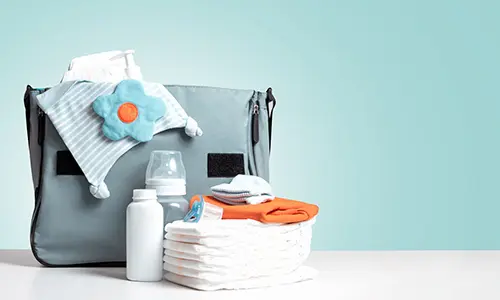
#4. Board games, unopened puzzles, and well-built toys are fun items to boost conversation and morale in a grid-down situation. Remember to look for missing pieces before purchasing.
#5. Books on various topics related to gardening, survival, cooking from scratch, and preserving food. Usually, these can be found at a cheap price and be both useful and entertaining.
#6. Children’s books are needed for entertainment and also learning.
#7. Camelback packs need to be cleaned and sanitized before use. They are useful for carrying water in outdoor settings and especially when hiking.
#8. Camouflage gear is primarily used for hunting but it is also warm and can be used for daytime wear if the temperatures are cool.
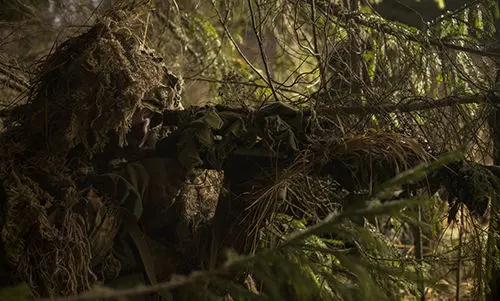
#9. Camp stoves and outdoor cooking equipment can be a bargain and serve a valuable purpose if electricity is out.
#10. Canners and pressure cookers – Look for racks and accessories to go with the canners. When buying a pressure cooker, look at the seals and the pressure gauge as they may need replacing. Although similar, canners are larger than pressure cookers and serve different purposes. Canners are used for canning; pressure cookers are used for cooking.
#11. Canning jars need to be checked for chips and cracks. You may need to purchase new lids so factor that into the purchase price.
#12. Cast iron cookware holds up well for either cooking on a grill or over a campfire. The cookware might be rusty but it will burn off easily enough. You will also need to spend time re-seasoning the Dutch ovens, pots, and frying pans.
Related: How To Restore A Cast Iron You Bought At Garage Sales
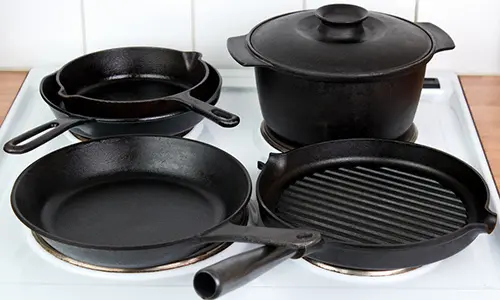
#13. Cots and bed rolls come in handy if there are visitors or if you find yourself sleeping outside. A bed roll makes a big difference under a sleeping bag so you can have a better night’s sleep.
#14. Dehydrators can help spread your food out to last longer; double-check to ensure proper operating.
#15. Extra clothing (heavy coats, raincoats, hard-wearing clothes) in various sizes for day-to-day wear or to use when doing lots of miscellaneous chores.
#16. First aid kits that contain ointments and supplies. Avoid opened boxes of gloves, ace bandages, and other disposables, and check the expiration dates. Related: 11 Unusual and Uncommon First Aid Items.
#17. Fishing equipment is often found in good condition. You can add to your supply or start a new hobby. Look for rods and reels, lures, fishing lines, tackle boxes, bait buckets, and nets.
#18. Flashlights of all kinds, including the hand crank models. There are many reasons you will need light.
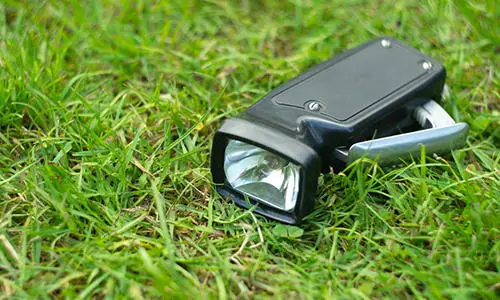
#19. Gardening tools of good quality help with planting fruits and vegetables. Look for wheelbarrows, shovels, rakes, hoes, hand plows, scythes, and other gardening tools.
#20. Gallon water bottles and larger water barrels to gather and store water like water tanks and rain barrels.
#21. Gas cans in a wide variety of sizes.
#22. Grain mill, meat grinder, coffee grinder, and any other specialty kitchen tools to help with food preparation and serving.
#23. Grill or smoker (heavy-duty) for use with wood or charcoal. Look for extra grill grates to be used over a campfire.
#24. Hand-operated food prep tools like hand-cranked whips, peelers, graters, and manual can openers for food preparation and serving.
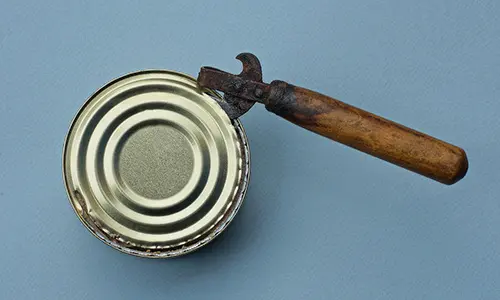
#25. Hand tools and carpentry tools like a wood planer, hand drill and bits, ax, machete, screwdriver, hammer, and any mechanic tool, etc. Try them out first so you know they work and have been well-maintained.
#26. Heavy-duty boots in various sizes. Look for relatively new boots to ensure better future wear and tear.
#27. Hiking packs, frames, and backpacks to carry heavy loads. There may be some items with a lifetime guarantee – check online.
#28. Homeschooling supplies like textbooks, teacher manuals, resource kits, workbooks, flashcards, games, and literature classics at various levels. They are more apt to be found at the end of a school year when homeschool parents are cleaning out their shelves or teachers may be doing the same thing as well.
#29. Hunting supplies primarily used for hunting are often found at yard sales. Look for firearms, ammo, binoculars, bows and arrows, compasses, slingshots, and night vision gear.
#30. Knives (good quality and assorted): multi-purpose and kitchen knives. Look for top brands if possible.
Reelated: 15 Things You Should Teach Your Children That Can Save Their Lives
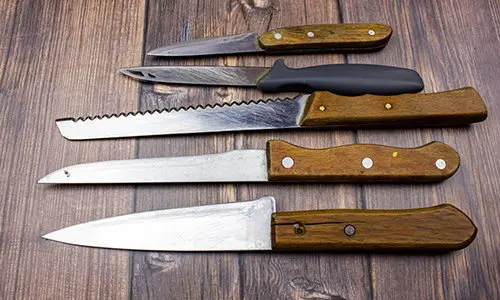
#31. Knitting needles, crochet hooks, and yarn for entertainment as well as to make necessary clothing and various kitchen items (hot pads, etc.).
#32. Lanterns, oil lamps, and candles as a backup if there is no electricity.
#33. Mess kits, canteens, and thermoses (avoid those that are foam-insulated as the insulation breaks down over time and won’t be as effective) to hold essential liquids.
#34. Multi-function tools to use in a variety of ways.
#35. Picnic supplies and lightweight utensils (plates, cups, glasses, silverware) for bugging out and camping.
#36. Propane tanks are used primarily for home heating, hot water, dryers, fireplaces, and generators.
#37. Radios (hand-cranked radios, weather radios, CBs, and ham radios) along with emergency supplies of all kinds for communication and to keep aware of ongoing situations.
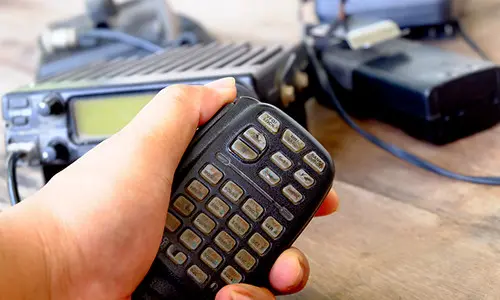
#38. Sewing, knitting, and crochet patterns and instructions to entertain and be purposeful in making various clothing and household items.
#39. Sewing supplies (fabric, needles, thread, buttons, zippers, patches, pin cushions, measuring tapes, an old treadle sewing machine, etc.) to mend and create new items.
#40. Sharpening stones and steel that can be used to keep your knives in the best-operating shape.
#41. Shelves and storage units to hold necessary supplies and equipment. Double-check to ensure they are stable.
#42. Silver and gold jewelry and coins can be a good investment; avoid silver-plated items and overpaying.
#43. Sleeping bags and wool/thermal blankets that are rated for cold temperatures. Check for high quality and, if purchasing, disinfect and launder them immediately.
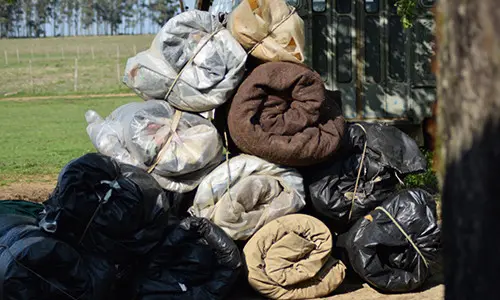
#44. Solar lights can be used for the patio or yard. They often need new storage batteries to work and/or last longer.
#45. Sterling silver flatware is a natural antibiotic. It is preferable for use in situations where sanitation is questionable. Silver can also be a good investment.
#46. Tarps and canvas have many uses from protection in all sorts of weather, in construction, and during disasters. They can be used to prevent messes when painting and in similar activities and to contain/collect debris.
#47. Tents and extra stakes for housing, entertainment, activities, etc. Make sure to check for any rips, tears, broken zippers, mold, or missing pieces.
#48. Tin cans, popcorn cans, and metal containers are rodent-proof and are good for storing food supplies. They are a good buy and may be found especially after Christmas.
#49. Vacuum sealer comes in handy to keep food fresh for up to five times longer than using plastic wrap or freezer bags. Check the seals to ensure there is no leakage.
#50. Wheelchairs, walkers, crutches, and other medical equipment are commonly needed in various emergencies. If you have room to store any of these, they might be useful.
You may also like:
 21 Gardening Items You Should Get From the Dollar Store
21 Gardening Items You Should Get From the Dollar Store
How To Store Food Without Electricity That Can Last Up To A Year (Video)
Native American Skills for the Modern Homesteader
1800s Pioneer Items You Should Still Have At Home
10 Items To Stockpile For When The Power Goes Out
How To Repurpose Old Items Into New Projects For Your Backyard

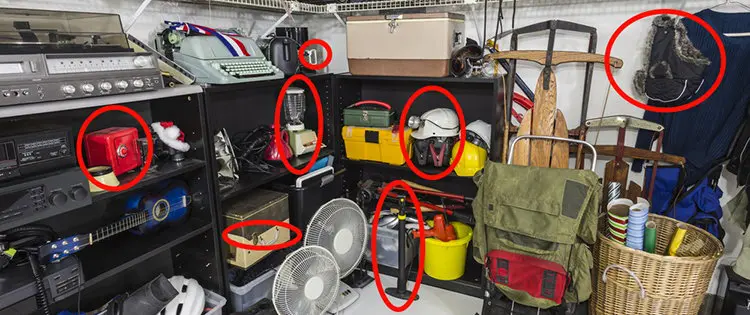








Great article! I really got a lot out of it. You gave me an idea when you mentioned tin cans, popcorn cans, ect. I know someone in the food business. They must have cans, containers, maybe food grade barrels.